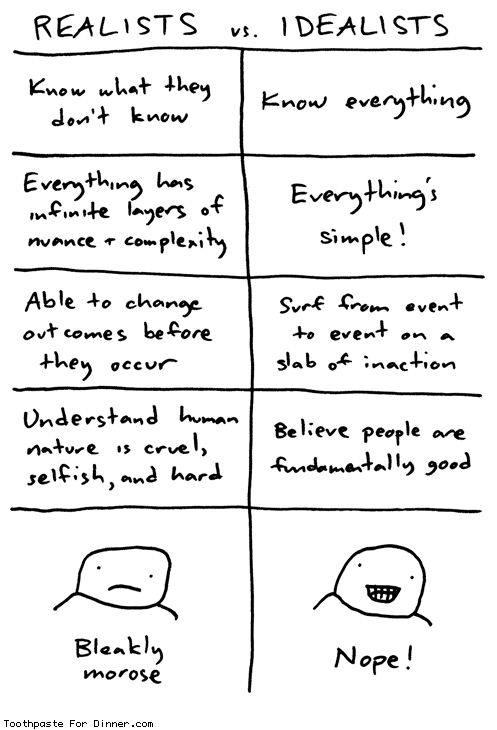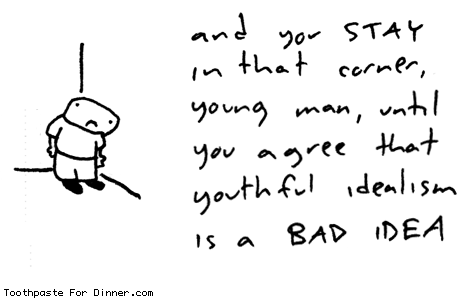Idealism, perhaps the easier to define simply, is mind over matter. It is the theory that any endeavor can be taken on and accomplished so long as you believe it can. The reality of an idealist is one of perfect order: truth can be understood because it is universal and the values of the idealist are absolute.
I like to think of idealism as the first two weeks of a school semester. The teacher presents a syllabus, and sure, it sounds like some things could be hard, but you can do it! Before midterms arrive, the ideals have passed on and you begin to think realistically (get it?): “Which assignments can I blow off and still manage a B or at least a C+?” (Of course, this semester I’ll get all A's, but as it just started last week, I’ll let you know what I think next week.)
See? Everything's fine! via
That changing point moves you into Realism. A realist has rejected the “impractical and visionary.” They move beyond the mind and deal strictly with the outside world and how things are in actuality. They perceive the physical nature of things, discover through the tried-and-true scientific method. Their values are generally moral ones, though not absolute like the idealist, and are based on the world around them rather than the unachievable perfection of their own minds.
A punishment I look forward to doling out on my own children.
Now as I have thought many times the lives of Adam and Eve, I have come to realize that despite being made for each other, they thought very differently.
We see from scripture that Adam was a true idealist. He was obedient to God’s commandments from the very beginning, and even when an angel asked why he was so obedient, Adam just hadn’t thought about it yet: “I know not, save the Lord commanded me.” (Moses 5:5-6)
In the garden, when the serpent realized no success could be had by beguiling Adam and his absolute values, he tried Eve.
Now, Eve was a rational type. She analyzed information given to her. When she was tempted, she presented the rational reasons why she hadn’t tried the fruit. Lucifer responded that the fruit would make her wise and give her knowledge, and when she realized there was no other way, she admitted defeat and went for it. (Gen 2)
Eve realistically thinks that fruit looks pretty good. via
Om nom nom.
After having eaten the fruit, she took it to Adam and, again in a rational and realistic manner, presented it to him. He ate, not necessarily because he wanted wisdom, or even because Eve made a good argument, but because because they had been commanded to stick together, and this was at least one ideal he could maintain. (Moses 4:18)
They got kicked out of Eden and had to suck it up and start laboring for food and shelter in the real world. (Moses 4:23-25, Gen 3:17-19) Despite all this, Eve put on a brave face and realistically, proclaimed it all to be for the best. "Were it not for our transgression we... never should have known... the joy of our redemption, and the eternal life which God giveth unto all the obedient.” (Moses 5:11)
So who wins? In the end, Adam is still the idealist (Moses 5:6), and Eve is still the realist. (Moses 5:11)
More importantly, does it matter?
_______________
Other than LDS Scripture (the Holy Bible and Pearl of Great Price specifically), my source material consists of:
History and Philosophy of Education, First Edition custom for BYU-Idaho by L. Dean Webb
Merriam-Webster at m-w.com






